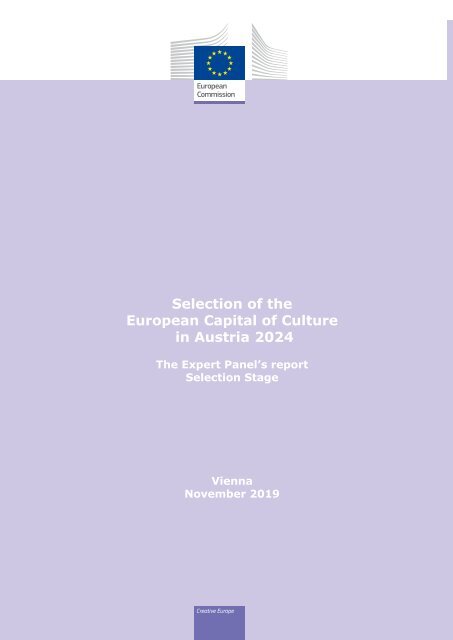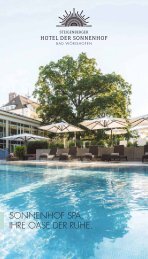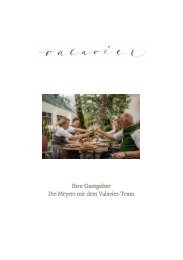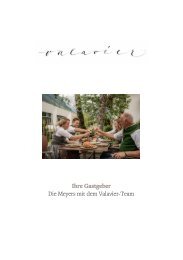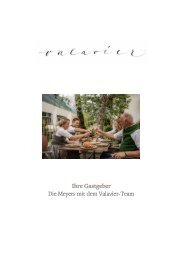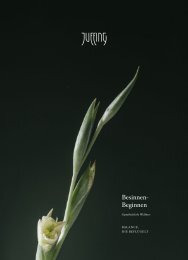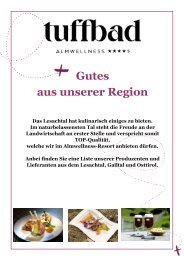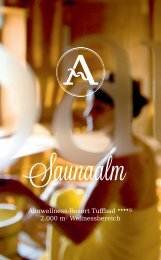Goldener Ochs - Kulturhauptstadt 2024 - Juryentscheidung
Create successful ePaper yourself
Turn your PDF publications into a flip-book with our unique Google optimized e-Paper software.
Selection of the<br />
European Capital of Culture<br />
in Austria <strong>2024</strong><br />
The Expert Panel’s report<br />
Selection Stage<br />
Vienna<br />
November 2019
EUROPEAN COMMISSION<br />
EUROPEAN COMMISSION<br />
Directorate-General for Education, Youth, Sport and Culture<br />
Directorate Culture and Creativity<br />
Unit D2<br />
E-mail: eac-unite-D2@ec.europa.eu<br />
European Commission<br />
B-1049 Brussels<br />
© European Union, 2019
Selection of the European Capital of<br />
Culture in <strong>2024</strong> in Austria<br />
Contents<br />
Introduction .................................................................................................. 4<br />
Pre-selection round ........................................................................................ 4<br />
Panel meeting ............................................................................................... 4<br />
National context ............................................................................................ 5<br />
Assessments of the candidates ........................................................................ 5<br />
Bad Ischl ...................................................................................................... 6<br />
Long-term cultural strategy...............................................................................6<br />
Programme .....................................................................................................6<br />
European dimension .........................................................................................7<br />
Outreach ........................................................................................................7<br />
Management ...................................................................................................8<br />
Capacity to deliver ...........................................................................................9<br />
Summary .......................................................................................................9<br />
Dornbirn ....................................................................................................... 9<br />
Long-term cultural strategy............................................................................. 10<br />
Programme ................................................................................................... 10<br />
European dimension ....................................................................................... 10<br />
Outreach ...................................................................................................... 11<br />
Management ................................................................................................. 11<br />
Capacity to deliver ......................................................................................... 11<br />
Summary ..................................................................................................... 12<br />
St. Pölten .................................................................................................... 12<br />
Long-term cultural strategy............................................................................. 12<br />
Programme ................................................................................................... 13<br />
European dimension ....................................................................................... 13<br />
Outreach ...................................................................................................... 13<br />
Management ................................................................................................. 14<br />
Capacity to deliver ......................................................................................... 14<br />
Summary ..................................................................................................... 14<br />
The Panel’s Decision ..................................................................................... 15<br />
Designation ................................................................................................. 15<br />
Melina Mercouri Prize .................................................................................... 15<br />
Reputation of an ECoC .................................................................................. 16<br />
The monitoring phase ................................................................................... 16<br />
The panel’s recommendations ........................................................................ 17<br />
Cultural strategy ............................................................................................ 17<br />
Cultural and artistic content ............................................................................ 17<br />
European dimension ....................................................................................... 18<br />
Outreach ...................................................................................................... 18<br />
Management ................................................................................................. 18<br />
Capacity to deliver ......................................................................................... 19<br />
3<br />
November 2019
Selection of the European Capital of<br />
Culture in <strong>2024</strong> in Austria<br />
Introduction<br />
The Austrian Federal Chancellery, Division Arts and Culture (the “Federal Chancellery”) is<br />
the managing authority of the competition which is governed by Decision 445/2014/EU of<br />
the European Parliament and the Council of 16 April 2014 as amended by Decision (EU)<br />
2017/1545 of 13 September 20172 (the “Decision”) 1 and by the “Rules of procedure –<br />
Competition for the <strong>2024</strong> European Capital of Culture (ECoC) in Austria” – (the “Rules”)<br />
adopted by the Federal Minister for the EU, Arts, Culture and Media and published on the<br />
Federal Chancellery’s website 2 .<br />
A panel of 12 independent experts was established for the selection procedure in line<br />
with Article 2 of the Rules. Ten members were appointed by the European Union<br />
institutions and bodies (European Parliament, Council, Commission and the Committee of<br />
Regions). Two members were appointed by the Federal Chancellery.<br />
The competition took place in two phases: pre-selection (shortlisting) and selection.<br />
Pre-selection round<br />
The Federal Chancellery issued a call for applications on 9 June 2017. Three applications<br />
were submitted by the closing date of 31 December 2018 by: Bad Ischl, Dornbirn and St.<br />
Pölten.<br />
The panel met in Vienna on 29-31 January 2019 and recommended to the Federal<br />
Chancellery three cities (Bad Ischl, Dornbirn and St. Pölten) to progress to the final<br />
selection stage. The panel’s report is published on the websites of the European<br />
Commission and the Federal Chancellery 3 .<br />
The Federal Chancellery accepted the panel’s recommendation and invited the three<br />
cities to submit revised applications with a deadline of 13 October 2019.<br />
All three cities submitted their revised applications (“bid-books”) by the deadline.<br />
A delegation of the panel (Beatriz Garcia, Anja Hasenlechner, Alin Adrian Nica and<br />
Dominik Nostitz-Rieneck) visited all three cities on 6, 8 and 9 November 2019, spending<br />
one day in each. They were accompanied by observers from the Federal Chancellery and<br />
the European Commission. The delegation reported to the panel at the selection meeting.<br />
1 See at:<br />
http://eur-lex.europa.eu/legal-content/EN/TXT/?uri=uriserv:OJ.L_.2014.132.01.0001.01.ENG and https://eurlex.europa.eu/legal-content/EN/TXT/?uri=CELEX:32017D1545<br />
2 See at:<br />
https://www.kunstkultur.bka.gv.at/documents/340047/637829/Rules+of+Procedure.pdf/8ab7296a-424e-<br />
4d62-95ca-b3af95423d09<br />
3 See at:<br />
https://ec.europa.eu/programmes/creative-europe/content/expert-panels-report-pre-selection-stage-selectioneuropean-capital-culture-<strong>2024</strong>-austria_en<br />
November 2019<br />
4
Selection of the European Capital of<br />
Culture in <strong>2024</strong> in Austria<br />
Panel meeting<br />
The panel met in Vienna on 10 and 11 November 2019. The observers, from the Federal<br />
Chancellery and the European Commission, took no part in the panel’s deliberations or<br />
decision. All panel members signed a declaration of no conflict of interest and<br />
confidentiality. On the 10 November, the panel confirmed Cristina Farinha as its Chair<br />
and Dominik Nostitz-Rieneck as Vice-chair.<br />
At the meeting, each candidate based on an order established by drawing, presented<br />
their case (in 45 minutes) and answered questions from the panel members (in 75<br />
minutes). Delegations had ten members: two were led by the Mayor, one by the CEO.<br />
The Chair of the panel announced the panel’s recommendation at a press conference<br />
after the meeting on 12 November 2019 in the presence of Mr. Alexander Schallenberg,<br />
the Austrian Minister for the EU, Arts, Culture and Media.<br />
National context<br />
<strong>2024</strong> will be the third time Austria hosts an ECoC after Graz in 2003 and Linz in 2009.<br />
The criteria for an ECoC have changed considerably since then. They now embrace a<br />
deeper and wider scope of the role of culture in the city and European development. A<br />
particular new requirement is for a city to have a formal cultural strategy including the<br />
ECoC project. This ensures that the ECoC is an element in the progress of a city and not<br />
a one-off event. It therefore enhances the importance of sustainable legacy. The<br />
selection of an ECoC is based on the programme specifically set out for the ECoC year in<br />
the bid-book and not on the current cultural offer in a city.<br />
The panel recognised three strong bids reflecting different socio-cultural contexts in the<br />
respective areas and the considerable proposal improvements and developments realised<br />
between the pre-selection stage and the final selection. The panel noted that all three<br />
cities have further used the opportunity of the bidding process to reinforce their cultural<br />
strategies as well as the role of culture in their overall socio-economic development. This<br />
is already a significant potential legacy of the ECoC competition. The panel encourages all<br />
cities to continue with the development and implementation of their strategies.<br />
Assessments of the candidates<br />
The panel assessed each candidate against the objectives of the ECoC programme<br />
(Article 2 of the Decision) and the six specific criteria in Article 5:<br />
<br />
<br />
<br />
<br />
<br />
<br />
Contribution to the long-term cultural strategy of the city,<br />
Cultural and artistic content,<br />
European dimension,<br />
Outreach,<br />
Management,<br />
Capacity to deliver.<br />
The panel emphasizes that its assessments of the candidates were based on the<br />
proposed programme set out in the bid-book and the presentation session. A city’s<br />
November 2019<br />
5
Selection of the European Capital of<br />
Culture in <strong>2024</strong> in Austria<br />
history, its recent and current policies, and cultural offer may form a basis for a<br />
programme but play no part in the selection process.<br />
Bad Ischl<br />
The candidacy of Bad Ischl <strong>2024</strong> is placed under the motto of “SALT.WATER” and<br />
proposes highlighting four dimensions: “The Power of Tradition”, “Impact of (Hyper-)<br />
Tourism”, “Flow of Retreat” and “Strengths of Counterculture”. The interconnections of<br />
the programme pillars have been strengthened for the final bidding phase and a stronger<br />
consideration of environmental issues was introduced. The overall budget available for<br />
the operating costs was increased to € 30 million and capital expenditures are at<br />
€ 1 million. The city of Bad Ischl with the Salzkammergut area submits a proposal based<br />
on a wide partnership with local municipalities from the Federal States of Styria and<br />
Upper Austria in an integrated urban-rural approach.<br />
Long-term cultural strategy<br />
A cultural strategy (“Kultur macht den Unterschied – Kulturvision 2030“) was adopted<br />
and it is in the course of implementation at the level of a region covering 23<br />
municipalities in Salzkammergut (SKGT). It reflects the cultural needs of the whole<br />
Salzkammergut area, including partners from the Federal States of Upper Austria and<br />
Styria. Beyond this innovative partnership – a first in the Austrian context – this<br />
integrated approach and related regional tourism strategy is forward-looking.<br />
The potential of the ECoC project as an asset for long-term strategy implementation is<br />
convincingly articulated. The existing sustainable cooperation framework of the EU-<br />
LEADER regions is of added value. The cooperation in the region beyond political<br />
background is important but bears the risk of divide, especially during election periods.<br />
In addition, capacity-building activities for local politicians are announced, but not<br />
sufficiently defined yet.<br />
The overall setting for the implementation of monitoring and evaluation is convincing.<br />
The indicators are clearly described, feasible and quantifiable. The inclusion of culture<br />
and environmental indicators is a valuable addition to the monitoring and evaluation<br />
plans. However, the collection of baseline data will be challenging as regular and<br />
consistent data gathering in the region has not been carried through. The bidding team<br />
is, however, aware of this risk.<br />
Cultural and artistic content<br />
The cultural and artistic programme was further developed since the pre-selection phase<br />
and offers a strong and clear narrative. The framework of the four themes is distinctive,<br />
meaningful and exciting. The overarching theme of “inclave” is convincingly translated<br />
into the different programme elements.<br />
Recommendations from the panel in the pre-selection phase regarding the need to<br />
rework the more difficult moments in recent history, namely WWII, were addressed in a<br />
satisfactory matter. The dark moments of Austrian history are a very important topic,<br />
which is well covered in the programme. Proposing a wide provenance research project<br />
for lost art is highly appreciated (“What happened to…?”). However, further elements<br />
need to be addressed (e.g. the involvement of the young Austrian Jewish community and<br />
the need to establish partnerships with more institutions dealing with these topics<br />
throughout Europe). The proposed work in the context of hyper-tourism has the potential<br />
6<br />
November 2019
Selection of the European Capital of<br />
Culture in <strong>2024</strong> in Austria<br />
to be of considerable added value for many other EU regions facing similar challenges.<br />
The plan to develop a more sustainable culture tourism strand for the region is anchored<br />
in the need to replace, or considerably alter, the currently mass-tourism oriented<br />
strategies into more locally culturally sensitive and sustainable ones. The programme<br />
strands on counterculture and power of tradition are planned in a solid manner. The<br />
programme comprises information on the estimated costs of the proposed projects.<br />
However, larger projects like the New Salt Festival need further careful elaboration and<br />
without intensive work on audience development prior to <strong>2024</strong>, it might turn into an<br />
expensive one-off event.<br />
The capacity-building that is presented as part of the cultural programme relies on four<br />
pillars: under the head of the SKGT culture schools (pillar one) are planned the Cultural<br />
Management School, the School of Art and Craft, the Salzkammergut Kulturschule while<br />
the museums development programme, the Open Culture Centre and Welocally, an<br />
online platform for exchange and cooperation, are three further pillars. This offers a<br />
comprehensive approach with substantial potential for legacy.<br />
The integrated way of programme development is reflected in the transversal<br />
involvement of artists, scientists and a wide range of additional stakeholders. The<br />
projects are deeply rooted in local communities, which may lead to the risk of<br />
downplaying the need of wider exchange. The territorial coverage of the whole region is<br />
well achieved.<br />
Traditional cultural activities are combined with a wide range of new inputs, including<br />
digital applications while the proposed ECoC opening could be mentioned as a good<br />
practice approach. However, related implementation details and budgetary frameworks<br />
require further attention.<br />
European dimension<br />
The European dimension builds on the concepts of “compassion” and “empathy”<br />
perceived as essential features for intercultural dialogue and key elements of<br />
contemporary European debates. Major European themes are convincingly translated into<br />
a rural “Cultural Geography”. The latter offers an innovative approach, which touches<br />
also on related and not yet fully developed EU and national cultural policies. The<br />
reference to the 30 th anniversary of Austria’s membership to the EU in <strong>2024</strong> is another<br />
very positive element of the bid.<br />
Partnerships with other European Capitals of Culture are already in place, but the full<br />
potential of these collaborations is not yet fully explored. This refers also to the general<br />
focus on the closer EU neighbours and the German-speaking countries. Yet, the topics<br />
covered in the bid-book are important for the whole of Europe and allow for a much<br />
wider partnership strategy. The involvement of artists from East Asia in the projects<br />
related to over-tourism reflects well the main countries of origin of those people visiting<br />
the region’s tourism hotspots and is an interesting element with potential for a wider<br />
impact. However, a deeper analysis of the cultural rights of tourists is still needed. The<br />
current debates focus on local inhabitants, which is an appropriate starting point. The<br />
outreach to European audiences needs further reflection regarding the new target group<br />
of sustainable and cultural tourists.<br />
Outreach<br />
The outreach activities are based on a solid involvement of the local population during<br />
the bidding phase using a wide range of different methodologies. This bottom-up<br />
November 2019<br />
7
Selection of the European Capital of<br />
Culture in <strong>2024</strong> in Austria<br />
initiative clearly builds on local communities, including young people in design and<br />
production.<br />
The establishment of an audience development strategy based on the assessment of<br />
needs is an appropriate approach. The creation of the position of ‘Education Ambassador’<br />
as a link between schools and the ECoC programme as well as a support mechanism for<br />
regional schools and a way to enhance culture and arts activities for pupils is an<br />
innovative idea. Educational culture programmes are designed in a co-creation process<br />
with schools. This strategic way of thinking becomes visible throughout the whole<br />
outreach chapter by the means of involving strategic partners, linking outreach activities<br />
to the proposed programme and considering outreach indicators in the evaluation<br />
framework.<br />
The involvement of volunteers is carefully thought through and covers a wide range of<br />
different backgrounds. The volunteer strategy involves sponsor's employees, students,<br />
but also elderly people through the Silver Salzkammergut task force and unemployed<br />
people. The intentions of involving people with dementia and Alzheimer are noticeably<br />
inclusive proposals. The idea for a ‘cultural buddy’ has the potential to break down<br />
barriers for accessing cultural activities.<br />
This inclusive and barrier-free programme has a strong starting point but could be also<br />
supported by investment in the accessible public transport and buildings.<br />
Management<br />
The management and governance structures as well as the budgetary frameworks are<br />
detailed in section 5 of the bid-book.<br />
The delivery structure is “Bad Ischl-Salzkammergut <strong>Kulturhauptstadt</strong> <strong>2024</strong> GmbH”<br />
(short: SKGT24 GmbH). The plans for the delivery structure's composition and<br />
organisation were further developed since pre-selection. The Supervisory Board<br />
composition is balanced between the city, the region, the sponsors and the national<br />
government with the Mayor of Bad Ischl as chair.<br />
The proposed organisational framework is more complex, which is explained partly by the<br />
fact that a whole region is bidding. The intended establishment of a common limited<br />
company co-financed by all involved cities and municipalities is an element providing the<br />
most needed long-term stability for a sound implementation of an ECoC.<br />
The proposed budget and its split between the different chapters is professional. The<br />
involvement of the private sector in co-financing of the ECoC is under way. However, the<br />
overall estimated private contribution of € 1 million is far too conservative considering<br />
that not only local and regional companies can be addressed. While appreciating the<br />
focus on EU funds for financing cultural infrastructures, the Panel considered it rather too<br />
optimistic.<br />
Instead of an Artistic Director, the candidate proposes a European Artistic Directory<br />
Board (EADB). It consists of seven members and is the top governing body of the artistic<br />
and cultural production. The board acts conceptually free and independent but has to<br />
meet the budgetary figures set by the General Director. Women and men will be equally<br />
represented in this Board, the same rule applying to leading positions such as Executive<br />
Producers.<br />
These proposed decision-making settings are innovative. Replacing the common model of<br />
one artistic director with an artistic board might generate added value and reflect a<br />
8<br />
November 2019
Selection of the European Capital of<br />
Culture in <strong>2024</strong> in Austria<br />
contemporary agile and participative approach. It would also allow combining bidding<br />
team members with newcomers for a sounder transition from bidding to implementation<br />
phase. However, unclear settings include the sequences of mandates. The way of<br />
operation of a “European” Board is not totally clear. The ECoC team is well established,<br />
and shortcomings identified in the pre-selection phase were convincingly addressed.<br />
The marketing slogan is "Culture is the New Salt". The candidate established a marketing<br />
cooperation with Salzkammergut Tourismus Marketing GmbH, which covers the<br />
marketing and communication strategy. All published materials will carry the appropriate<br />
EU branding. Marketing messages are simple, coherent with the ECoC mission and clearly<br />
based on a storytelling approach. The European and digital dimensions of marketing an<br />
ECoC is not yet addressed in a satisfactory way.<br />
Capacity to deliver<br />
There is a political support from the involved cities and municipalities, and the budget is<br />
approved. The mayors further confirmed their full support. A majority of the 23<br />
municipalities in the region have already confirmed their participation. Further<br />
municipalities are invited to join the ECoC under the condition that they co-finance; this<br />
is an appropriate approach for a limited period of time to keep positive local dynamics.<br />
The budgetary framework is not yet fully stable, as some of the regional co-financiers<br />
conditioned their support to the selection of Bad Ischl as European Capital of Culture. The<br />
involved cities and municipalities have approved budgets for the ECoC, and the financial<br />
commitment of the regional tourism board is an additional asset and stabilising factor.<br />
Cultural infrastructures are in place related to the requirements of a larger part of the<br />
programme activities. However, capital investments are not yet planned into full detail.<br />
Tourism facilities are already in place.<br />
Summary<br />
A very solid bid based on an integrative strategic framework covering a wider area of<br />
central Austria under the lead of the city of Bad Ischl. The programme builds on a<br />
comprehensive bottom-up approach translating important themes including hypertourism<br />
– relevant for the bidding region – with high relevance for other European and<br />
international stakeholders. The proposed outreach activities are of very high quality. The<br />
proposed narrative has the potential to touch both local and international audiences.<br />
Remaining challenging elements comprise the widening of the European dimension<br />
beyond Central Europe and the German-speaking countries; the negotiations of financial<br />
support, the complex framework involving several Federal States; as well as the<br />
requirement for more solid planning for the proposed cultural reconversions of some<br />
infrastructures.<br />
Dornbirn<br />
Dornbirn <strong>2024</strong> aims to generate an “Outburst of Courage” and implement a programme<br />
based on three programme lines: “Polis Mind”, “Reality Disruption”, and “No Frontiers”.<br />
These thematic focal points remained unchanged since pre-selection. The total budget for<br />
operational activities is € 46 million, and € 29 for capital expenditures. The partnership<br />
for the bid encompasses the cities of Dornbirn, Hohenems, and Feldkirch, as well as the<br />
November 2019<br />
9
Selection of the European Capital of<br />
Culture in <strong>2024</strong> in Austria<br />
adjacent region of the Bregenzerwald. Further cooperation is planned with partners from<br />
the Bodensee region.<br />
Long-term cultural strategy<br />
The cultural strategy for the city of Dornbirn, “Dornbirn 2030”, is in place, and<br />
neighbouring partnering cities Hohenems, Feldkirch and Bregenzerwald have joined in.<br />
Despite this important step forward, the wider vision for a long-term cultural cooperation<br />
after the title year in the Rhine valley is not fully put in place. This affects negatively the<br />
potential for legacy. Good elements in the strategy are the intended urban<br />
transformation, the ecological awareness (green events and green museums), the centre<br />
for cultural creators and the integrated approach with reference to local mobility and<br />
transport. Furthermore, the ECoC year is well embedded in the strategy. The digital<br />
strategy for Vorarlberg is another strong connecting point.<br />
Evaluation is professionally planned and it includes many innovative elements such as<br />
new approaches for the visualisation of data and results, involving artistic interventions.<br />
However, their feasibility raises questions. The set of indicators proposed is adequate.<br />
Cultural and artistic content<br />
Major discrepancies were spotted between the programme outlined in the bid-book and<br />
the final hearing of the team, which focused ostensibly on another central topic:<br />
“feminism”. This new thematic emphasis is not fully translated into the proposed cultural<br />
and artistic projects and in the existing programme, where mainly prominent male artists<br />
were promoted. Furthermore, the programme lacks a coherent thread beyond a general<br />
emphasis on social transformation. More locally sensitive and less provocative extreme<br />
artistic tools might have contributed better to generate the desired changes in the<br />
perceptions and values of the local population. The links with the local heritage are clear,<br />
but key projects like the museum of industry seem unfeasible. The house of literature is<br />
another interesting and professionally designed project. The digital studios are also a<br />
strong element of the bid, with potential for legacy. Many of the proposed<br />
implementation activities are, however, still in a preliminary stage and related cost<br />
estimations are not provided. The wider potential in terms of cross-border cooperation in<br />
culture and arts was not used.<br />
The involvement of local cultural operators and artists raises further questions. This<br />
relates also to the changing thematic foci between the bid-book submission and the final<br />
presentation. Furthermore, the call for projects was very small, providing only little<br />
budget for the applicants.<br />
The capacity-building programme is valid but still at an early development stage.<br />
European dimension<br />
The European dimension is planned to be addressed through the main themes of digital<br />
art, migration, female share in arts and culture, and engagement for a humanistic<br />
Europe. While these topics are relevant in and for Europe, no overarching and specific<br />
European narrative becomes visible. Related questions specifically relevant for a border<br />
region are not further elaborated. The female thematic is discussed in the bid-book in a<br />
very specific (and restrictive) manner – i.e. women not working full-time due to a lack of<br />
childcare facilities. This is a difficult approach for generating a wider European debate.<br />
The Europe-wide networking activities of some of the key cultural partners like the<br />
Jewish Museum are impressive, but the European outreach to networks and other<br />
10<br />
November 2019
Selection of the European Capital of<br />
Culture in <strong>2024</strong> in Austria<br />
European Capitals of Culture is not yet at a mature stage. Border partnerships (with<br />
Switzerland, Germany and Liechtenstein) are not specified. Of added value is the<br />
mention of Europeana – the European digital library. The plans to reach out to a wider<br />
European audience remain fragmented.<br />
Outreach<br />
The number of clubs and associations mentioned is impressive and provides a huge<br />
potential for cooperation and volunteering. The volunteer potential in particular is quite<br />
strong and it has been proven during the organisation of GYMNAESTRADA 2019, which<br />
involved thousands of volunteers. However, the related plans seem to be only in the<br />
making and few formal agreements have been concluded. The involvement of non-native<br />
Austrian communities is still very limited and related project proposals do not fully reflect<br />
the European state-of-the-art. Recent civic movements in Vorarlberg e.g. for the better<br />
integration of refugees arrived in the region during the past years, are not involved.<br />
The organisation of focus groups was a good starting point to better understand the<br />
needs and perceptions of the local residents, but the tools for involvement need to be<br />
developed considerably.<br />
Some interesting ideas are mentioned, like the Culture Tandem app, but the audience<br />
development – based mainly on project quality and educational programmes – was not<br />
yet satisfactorily developed.<br />
Management<br />
The budgetary settings are well established and sound. Related plans to attract further<br />
EU means are realistic and well defined. However, the specific budget proposed for the<br />
independent scene might turn out to be hard to implement.<br />
The organisational structure is professional, and the engagement of a full female team is<br />
a strong symbolic message on the regional and EU level. However, the existing<br />
structures are fragile to fully cope with all the needs for a good preparation and<br />
implementation of an ECoC.<br />
The plan to keep in the implementation phase the key staff that has worked on the bid so<br />
far is a valid approach per se, but limiting the opportunity for new perspectives and the<br />
availability of specific competences different from those for the bidding process.<br />
The digital marketing plans are well developed. The overall marketing narrative with the<br />
main messages is in place. However, the chosen thematic angle is not convincing.<br />
Capacity to deliver<br />
The bid benefits of a good support from the local political level and related decisions were<br />
formally taken. The regional government promised support.<br />
The proposed new cultural infrastructures are meaningful for an ECoC and related plans<br />
outlined. The accessibility of the Rhine valley and the Bregenzerwald area are wellestablished<br />
comprising air, rail, highway and waterways. Tourism facilities are in place to<br />
cope with the needs.<br />
November 2019<br />
11
Selection of the European Capital of<br />
Culture in <strong>2024</strong> in Austria<br />
Summary<br />
An interesting bid covering the far west of the Austrian territory in the border region with<br />
Liechtenstein, Switzerland and Germany, based on a sound budgetary setting, many<br />
innovative approaches in evaluation as well as digital activities. The full female team is a<br />
strong message to Europe and to the bidding region. Major challenges include<br />
considerable discrepancies in the communication of the main artistic and cultural<br />
programme narrative and only fragmented involvement of the local communities and<br />
further stakeholders. The proposed European themes are relevant, but the specific<br />
situation as “a small Europe” close to three other countries inside and outside the EU was<br />
not sufficiently explored.<br />
St. Pölten<br />
The thematic leitmotiv of St. Pölten ECoC <strong>2024</strong> candidacy is “Rescaling Distances” and<br />
covers three main routes or programme strands: “Come Closer” (social distances), “The<br />
Long Now” (temporal distances), and “Changing Rooms” (spatial distances). The concept<br />
of reducing distances remained unchanged from the pre-selection phase. The total<br />
budget available for operating activities is the same since the submission of the first bidbook,<br />
reaching a total of € 60 million. Capital investments are expected to be at<br />
€ 36 million. The bid of St. Pölten covers the wider region, which should transform to a<br />
common Cultural Region in the course of the preparation and implementation of the<br />
European Capital of Culture project.<br />
Long-term cultural strategy<br />
The “Cultural Strategy St. Pölten 2030”, approved in September 2019, provides a very<br />
good basis for future cultural development of the city. The strategic approaches are<br />
based on serious research and complementary documents e.g. the “Guidelines for Public<br />
Space” and they are of substantial value. The concept of tackling the problems of midsized<br />
cities, although relevant for many cities in Europe, was too broad and not explored<br />
in a distinctively enough manner. It was not perfectly clear for example if the cultural<br />
strategy provides the right answers for all the strata of population that are typical for<br />
these smaller urban places. The Cultural Region idea became less visible in the selection<br />
phase. The long-term strategy regarding the relationship with nearby Vienna – a key part<br />
for cultural development in the city of St. Pölten – remains fragmented and many<br />
dimensions of integrated planning are not addressed. The highlighted cooperation with<br />
the Vienna tourism board is a relevant achievement but only a starting point.<br />
The ECoC is well anchored in the long-term cultural strategy and includes a clearly<br />
presented ‘Compass’ concept. The provision of an elaborated plan B for delivery is<br />
evidence of thorough and professional planning.<br />
The plans for evaluation and monitoring are conceptually very strong. However, at the<br />
current stage, the set of indicators and the plans for the elaboration of baselines is less<br />
convincing. The proposed innovative approaches – such as participatory / resident-led<br />
evaluation – are important, but difficult to implement successfully.<br />
Legacy plans from the city of St. Pölten for the time after the ECoC are not fully clear.<br />
12<br />
November 2019
Selection of the European Capital of<br />
Culture in <strong>2024</strong> in Austria<br />
Cultural and artistic content<br />
The cultural and artistic programme was considerably better structured for the final<br />
selection phase and the three programme strands were clearly conceptually articulated<br />
and visualised in the bid-book, which makes them easily understandable for a wider<br />
audience.<br />
The Main Station approach including a digital dimension is a forward-looking idea<br />
connecting with European partners. The Children.Art.Lab is a valuable new initiative with<br />
a potential for St. Pölten to become an important player in the European children cultural<br />
scene. Addressing specifically the Jewish heritage and culture is an asset of the<br />
programme. The creative industries projects are interesting, and the way they are<br />
conceptually rooted in traditional craftsmanship is original. Still, they lack wider<br />
perspective and vision beyond a mere design-led approach. The Sonnenpark proposes<br />
original community-involving concepts that put an accent on ecology. While several<br />
programme elements have a development potential, the wider coherence of the projects<br />
proposed with a specific and targeted European narrative is not made fully visible. In<br />
addition, projects’ ideas presented in the bid-book are not always in an advanced<br />
development stage. Current archaeological practices in the city require further research<br />
and exchange with experts.<br />
The involvement of the local cultural operators is substantial and some of the projects<br />
benefit of high-quality artists’ engagement, including those from neighbouring countries.<br />
The capacity-building approach of CulturalChangeCampus is ambitious, but the proposed<br />
complex structure might prevent full impact. The implementation settings remain vague.<br />
European dimension<br />
The European dimension is anchored in six main topics related to European History,<br />
European Neighbours, Nature & Climate, Places, Migration in the sense of Mobility and<br />
European Diversity. The six topics however did not fully translate into a clear and<br />
coherent European narrative. These very broad themes are also difficult to relink to the<br />
cultural and artistic programme. The main and specific messages of St. Pölten to Europe<br />
remain unclear.<br />
The Museum of European Integration is an interesting but challenging and unclearly<br />
presented concept. Cooperations with European partners are very much focussed on<br />
Central Europe, and not stretching out enough to Europe as a whole.<br />
The exchange with other ECoCs has started, but the full potential for common projects<br />
and exchanges is not exploited.<br />
The reflection on how to involve a broad European audience needs to be further<br />
developed, to include also a strategy to involve the international audience present in<br />
Vienna, beyond international tourists.<br />
Outreach<br />
The outreach activities involved a wide range of locals during the preparation phase. In<br />
this respect, the main legacies are: The Children.Art.Lab and the CulturalChangeCampus.<br />
Professional outreach activities include the involvement of schools in the preparation and<br />
implementation, the launch of open calls, the planned activities for a broader cultural<br />
participation of people with special needs and the older generation.<br />
November 2019<br />
13
Selection of the European Capital of<br />
Culture in <strong>2024</strong> in Austria<br />
The wider cross-sectoral cooperation was not sufficiently defined and the added value of<br />
the broad scientific community in the city and region was not enough explored.<br />
The general principles for an audience development strategy are in place and the plans<br />
for an own related department are a good starting point. However, the related plans,<br />
beyond education and co-creation activities, lack further concretisation.<br />
Management<br />
The budgetary framework is considerable and the proposed budget for a potential plan B<br />
is substantial. The staff costs are high compared to other ECoC projects and related<br />
explanations were not fully convincing.<br />
The organisational structure is already established, which provides further stability to the<br />
project. The current team was considerably enlarged with members, partners and service<br />
providers who are Vienna-based, which raises questions regarding their sustainable<br />
involvement in the local development of the city. No incentives structure for a long-term<br />
commitment of this external staff to the city has been presented.<br />
The proposed leadership combining a broader team was not convincingly argued, as the<br />
fact that so far all the conflicts could be solved constitutes no guarantee for the future.<br />
The unanimity decision-making principle might lead to standstill and conflicts between<br />
the members of the team.<br />
The marketing plans regarding the digital domain are good, but wider marketing plans<br />
are not yet put in place. ECoC leitmotif: “Europe at Home – Rescaling Distances” and<br />
appeal: “You only need to change direction” do not translate into appealing and clear<br />
marketing narrative.<br />
Capacity to deliver<br />
The bid relies on a strong local and regional support, and related commitments have<br />
been voted timely. However, the panel was unable to further clarify organisational<br />
support of local and regional decision-makers regarding implementation and legacy<br />
issues.<br />
The city, which is only a 25-minute drive from Vienna, benefits from excellent<br />
accessibility and a wide range of tourism facilities – also in the city of Vienna – which can<br />
be used by visitors. Furthermore, plans to enlarge also the city’s hotel infrastructure by<br />
<strong>2024</strong> are already in an advanced stage.<br />
The cultural infrastructure requires improvement and related plans are being put forward.<br />
However, the concrete status of negotiations after first agreements with the private<br />
owners of parts of the proposed infrastructure as well as related legacy plans could not<br />
be clarified.<br />
Summary<br />
A solid bid embedded in a long-term cultural strategy, a promising budgetary framework,<br />
a clear programme structure as well as professional bottom-up activities involving many<br />
locals and schools. The artistic programme is built on the involvement of many highquality<br />
artists from Lower Austria, Austria and other European countries with a special<br />
focus on the neighbouring area. The digital elements in the programme and marketing<br />
14<br />
November 2019
Selection of the European Capital of<br />
Culture in <strong>2024</strong> in Austria<br />
are a further asset of the bid. An important shortcoming concerns the capacity for the<br />
bid's core narrative – and its proposed cultural and artistic programme – to translate into<br />
a powerful and fully engaging European narrative of relevance across the continent. As it<br />
stands, the bid's core vision is still heavily conceptual and, despite it being of critical<br />
relevance at a local and regional level, it can easily fail to connect with other parts of<br />
Europe. The regional concept became less visible than a pre-selection stage and the<br />
long-term perspectives of some of the cultural infrastructural projects based on privately<br />
owned buildings are not fully clear.<br />
The Panel’s Decision<br />
The panel was presented with three distinctive bids from three different cities and<br />
adjacent regions facing their own challenges and each with its own interpretations of the<br />
ECoC criteria. The bids had many strong points as well as some weaknesses. The panel<br />
was looking, according to Decision 445/2014/EU of the European Parliament and the<br />
Council, at the programme specifically designed for the ECoC year.<br />
After the presentations, the panel debated the merits of each city against the six criteria<br />
and then in the final discussion the applications were weighed up against each other.<br />
Each panel member weighed their own interpretation of the criteria against the three bids<br />
with their bid-books, presentations, questions and answers, augmented by the feedback<br />
from the visits.<br />
The panel reached consent on a single candidate in the first round by secret ballot.<br />
Following the panel vote, the panel recommends that the Federal Chancellery designates<br />
as the <strong>2024</strong> European Capital of Culture in Austria, the city of<br />
Bad Ischl.<br />
Designation<br />
This report has been sent to the Federal Chancellery and the European Commission. Both<br />
will publish it on their websites. In accordance with Article 11 of the Decision, the Federal<br />
Chancellery will designate Bad Ischl to hold the title of ECoC <strong>2024</strong> in Austria based on the<br />
recommendation contained in this report. It will then inform the European Parliament,<br />
the Council, the Commission and the Committee of the Regions. This formal designation<br />
enables Bad Ischl to use the title “European Capital of Culture <strong>2024</strong>”.<br />
Melina Mercouri Prize<br />
The panel recommends that the European Commission award the Melina Mercouri Prize<br />
to the delivery structure of Bad Ischl <strong>2024</strong> based on this report. However, the payment<br />
of the €1,5m Prize is deferred until <strong>2024</strong>, in line with Article 14 of the Decision. It is<br />
conditional. The ECoC Expert panel will make a further recommendation to the European<br />
Commission in late 2023 at the end of the monitoring process on whether to make the<br />
payment.<br />
November 2019<br />
15
Selection of the European Capital of<br />
Culture in <strong>2024</strong> in Austria<br />
The conditions for the payment are as follows (Article 14):<br />
<br />
<br />
<br />
<br />
<br />
<br />
<br />
<br />
<br />
The ECoC honours its commitments made in the application;<br />
It complies with the criteria;<br />
It takes into account the recommendations contained in the selection and<br />
monitoring reports;<br />
There has been no substantial change to the programme and strategy set out<br />
in the bid-book;<br />
The budget has been maintained at a level capable of delivering a high-level<br />
programme and at a level consistent with the bid-book;<br />
The independence of the artistic team has been appropriately respected;<br />
The European Dimension has remained sufficiently strong in the final<br />
programme;<br />
The marketing and communications strategy and material clearly reflect it is a<br />
European Union action;<br />
Plans for monitoring and evaluation are in place.<br />
Reputation of an ECoC<br />
A city awarded the ECoC title receives considerable international attention from the<br />
selection recommendation and extending well beyond the ECoC year. It has a<br />
responsibility to uphold the reputation of the ECoC brand for the benefit of those previous<br />
titleholders and future ones. City administrations should be aware that decisions taken<br />
(and not just in the cultural sector) may attract formal media and social media attention<br />
far beyond they are used to handling. This adds a special and new aspect to decision<br />
taking in the city over wide full range of issues much beyond culture only.<br />
The monitoring phase<br />
Once an ECoC has been designated, it enters the “Monitoring Phase” (Article 13 of the<br />
Decision). Under the auspices of the European Commission, the panel will work with the<br />
ECoC to ensure the quality of the ECoC brand and to offer advice and experience.<br />
The bid-book at final selection becomes the de facto contract between the designated<br />
city, on the one hand, and the Expert panel, the Federal Chancellery, the European<br />
Commission and its own citizens, on the other hand. It has an important role in the<br />
payment of the Melina Mercouri Prize. The panel will expect a close alignment with the<br />
bid-book during the preparation phase and during the ECoC year. Significant variations<br />
from the bid-book should be discussed with the panel, through the Commission, in<br />
advance of decisions being made.<br />
There are three formal monitoring checkpoints (normally autumn 2020, mid 2022 and<br />
autumn 2023) when the ECoC will meet with the panel under the auspices of the<br />
Commission. Prior to each meeting the European Commission will invite the ECoC to<br />
provide progress reports. The Commission, after consultation with the panel, will indicate<br />
areas that specifically need to be addressed in the reports.<br />
In addition, the panel may decide, with the agreement of the European Commission, to<br />
visit the city to observe progress.<br />
16<br />
November 2019
Selection of the European Capital of<br />
Culture in <strong>2024</strong> in Austria<br />
The panel’s reports after all three meetings will be published on the Commission’s<br />
website. The ECoC may decide to publish its own progress reports in the interest of<br />
transparency.<br />
The panel’s recommendations<br />
The designated ECoC now moves to a transition period from a set-up suited to a bid<br />
campaign to the more formal ECoC delivery structure that is independent of local city<br />
administration. The panel expects Bad Ischl to develop cooperation with other bidding<br />
cities and the wider artistic and cultural community in Austria. The ECoC in Austria in<br />
<strong>2024</strong> provides a national opportunity, which will reflect internationally not only on Bad<br />
Ischl but also on the country as a whole.<br />
The panel will expect the first progress report in autumn 2020 to take into account the<br />
recommendations and comments in the assessment of the bid as well as the<br />
recommendations below.<br />
The recommendations refer to the content of the proposed programme:<br />
Cultural strategy<br />
<br />
<br />
<br />
The work continues on the implementation of the cultural strategy and further<br />
arrangements are made for integration between policy areas (culture / urban<br />
development / innovation / social and transforming tourism industries). All<br />
documents are published to ensure transparency.<br />
The investments in the existing social cohesion are continued and enhanced in<br />
the EU-Leader framework, across borders of Federal States, to train and<br />
support local policy makers as important partners for the implementation of<br />
the ECoC and a full understanding of the cultural dimensions of regional<br />
development.<br />
The ECoC <strong>2024</strong> impact assessment is detailed with monitoring tactics, the<br />
baseline figures are defined and first attempts to outline the specific targets<br />
are made. KPIs include European sources of information like Eurostat for<br />
example.<br />
Cultural and artistic content<br />
<br />
<br />
<br />
<br />
The highly relevant main topics and programme strands require beyond the<br />
well-rooted local participation and involvement of a wider population in order<br />
to build up a wide range of meaningful projects for the wider European<br />
audience.<br />
An open communication approach is required to cooperate with the wide range<br />
of programme partners in a professional and transparent manner.<br />
High budget projects require special attention of the team and value for<br />
money should be analysed at a very early stage and potential plan B should be<br />
elaborated.<br />
The digital dimension of the ECoC should be further considered in order to<br />
reach out to all kinds of audiences including the younger part of the European<br />
November 2019<br />
17
Selection of the European Capital of<br />
Culture in <strong>2024</strong> in Austria<br />
<br />
population who has no direct access to local analogue culture and<br />
communication formats.<br />
To continue to develop the capacity building programme under the banner of<br />
cultural and artistic dimension and by these means enlarge the understanding<br />
of learning beyond the formal parts; and to ensure appropriate space settings<br />
for these activities early in the implementation phase.<br />
European dimension<br />
<br />
<br />
<br />
The scope and quality of activities promoting the cultural diversity of Europe,<br />
intercultural dialogue and greater mutual understanding between European<br />
citizens as well as highlighting the common aspects of European cultures,<br />
heritage and history are secured, deepened and developed.<br />
The cooperation and artistic exchange gains in dimensions covering the whole<br />
territory of the European Union and including a European dimension in literally<br />
all projects. To build on the good practice with the involvement of artists from<br />
Asia to further work with cultural partners from main countries of origin of<br />
tourists in the region.<br />
The enlargement of exchange and knowledge-transfer on the dark side of the<br />
local history with other regions and cities equally concerned, as well as with<br />
related scientific and cultural organisations in Europe and beyond.<br />
Outreach<br />
<br />
<br />
<br />
<br />
Work continues to ensure social cohesion, involvement of all strata of the<br />
population and collaborative spirit in line with ECoC mission and vision.<br />
ECoC audience development strategies and plans for local, regional and<br />
international audiences are developed. A special focus to be dedicated to reach<br />
out to European and international audiences and to required digital outreach.<br />
Audience development and community engagement are included in capacity<br />
building activities.<br />
To ensure access to the region by innovative mobility concepts and<br />
accessibility – a special challenge to be addressed for the more rural parts of<br />
the ECoC region.<br />
Management<br />
<br />
<br />
<br />
<br />
The appointment of the artistic board in order to ensure continuity and<br />
innovation at a very early stage of the implementation phase.<br />
Information about the registration of the Bad Ischl <strong>2024</strong> organization and its<br />
statutes are publicly available.<br />
Clarification of the national level financial involvement is necessary and the<br />
funding timeframe and conditions allowing smooth implementation of the<br />
ECoC need to be agreed with all stakeholders as soon as possible. Decisions<br />
makers in Austria should be aware of considerable negative consequences<br />
related to late decisions on budgets.<br />
The elaboration of a comprehensive fundraising strategy covering the wider<br />
territory and including a wide range of potential sponsoring partners. Good<br />
practices from previous ECoC could be used.<br />
18<br />
November 2019
Selection of the European Capital of<br />
Culture in <strong>2024</strong> in Austria<br />
<br />
<br />
<br />
<br />
<br />
Clarification of the specific roles and added value of the proposed European<br />
board.<br />
The strategies and copyright issues including authorship rights of related<br />
merchandise and services are developed and publicly communicated.<br />
The communication message (including a European dimension) is clearly<br />
articulated for use by the ECoC team and other relevant stakeholders.<br />
Issues of security are addressed.<br />
Issues of data protection are addressed.<br />
Capacity to deliver<br />
<br />
<br />
<br />
<br />
Ensure regional leadership in order to cope with diverse expectations and<br />
internal cohesion needs.<br />
The tourism offer and communication for the region continuously reflects the<br />
new concepts on cultural and sustainable tourism.<br />
To keep positive local dynamics regarding further municipalities wishing to join<br />
the ECoC, but to set a related deadline for early in 2020.<br />
The planning for the required adaptations of cultural infrastructures must be<br />
speed up and related procedures launched.<br />
Thanks<br />
The panel wishes to place on record its thanks to the Minister, the staff of the Federal<br />
Chancellery, ably supported by DG EAC of the European Commission, for their efficient<br />
management of the competition.<br />
Signed<br />
Cristina Farinha (Chair)<br />
Dominik Nostitz-Rieneck (Vice-Chair)<br />
Sylvia Amann (Rapporteur)<br />
Paulina Florjanowicz<br />
Beatriz Garcia<br />
Dessislava Gavrilova<br />
Anja Hasenlechner<br />
Alin Adrian Nica<br />
Pierre Sauvageot<br />
November 2019<br />
19
Selection of the European Capital of<br />
Culture in <strong>2024</strong> in Austria<br />
Jiří Suchánek<br />
Agnieszka Wlazel<br />
Suzana Žilič Fišer<br />
Vienna<br />
November 2019<br />
20<br />
November 2019


